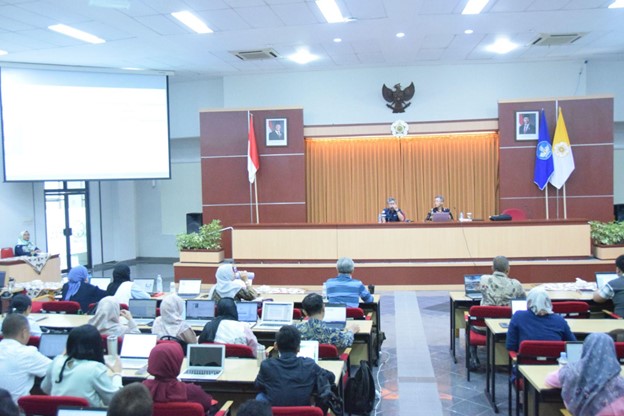

On November 13th 2024, the Graduate School of Universitas Gadjah Mada (SPs UGM) held a NVivo training, a software designed for qualitative data analysis. The training took place in the Auditorium on the 5th floor of the Graduate School Building, Unit 1, UGM, and was attended by approximately 150 students from the master’s and doctoral programs at SPs UGM.
The Vice Dean for Finance, Assets, and Human Resources at SPs UGM, Dr. techn. Khabib Mustofa, M.Kom., attended to deliver a speech and officially open the training session. “This training has been planned for a long time, and we hope students will benefit from it, especially in assisting the thesis or dissertation writing process,” Dr. Khabib emphasized. He stressed the importance of integrating technology into the educational process, particularly in Indonesia as a developing country, where access to advanced research tools can significantly enhance the quality of academic work.
The training, titled “NVivo Training: Qualitative Data Processing,” featured Dr. Suripto, S.,IP., MPA, a lecturer from the Department of Management and Public Policy, Faculty of Social and Political Sciences at UGM. He is also the author of the book “Program Aplikasi New NVivo untuk Analisis Penelitian Kualitatif”, which comprehensively discusses the process of importing, processing data, and presenting results using NVivo.
During the two-hour training session, Dr. Suripto provided theoretical insights into NVivo software and explained its features and functionalities. “A software will not function properly without commands from its user, so it is essential to understand how NVivo works before starting to operate it,” Dr. Suripto explained.
After the students received an overview of NVivo, Dr. Suripto conducted a live demonstration using the NVivo software. This practical approach allowed the students to apply what they had learned and gain skills in operating NVivo. The practice sessions covered practical techniques in NVivo such as data coding, creating categories, and applying thematic analysis.
Through this training, students were equipped with the skills required for the modern job market. This training also supports the development of quality education at the graduate level.
Author: Asti Rahmaningrum
